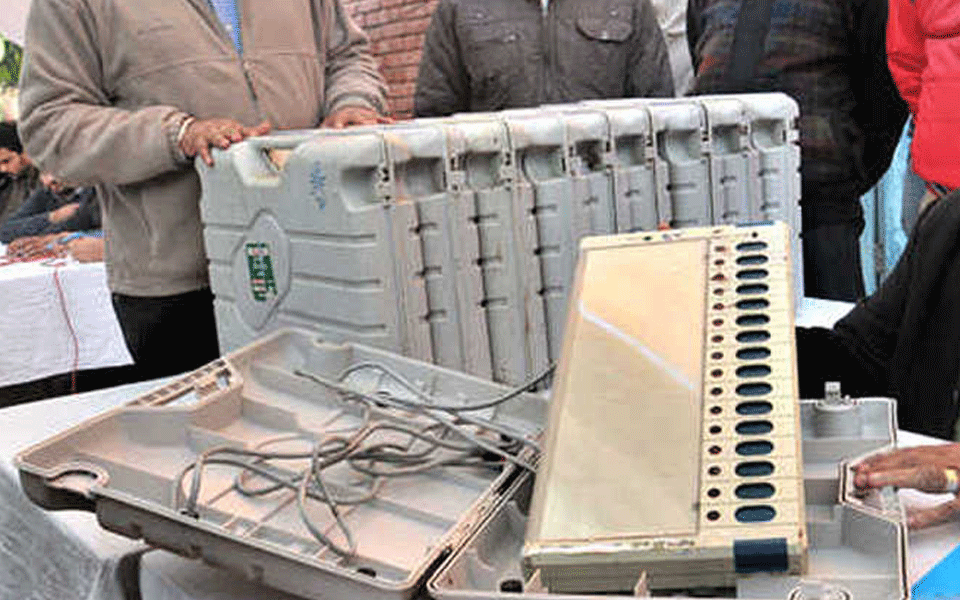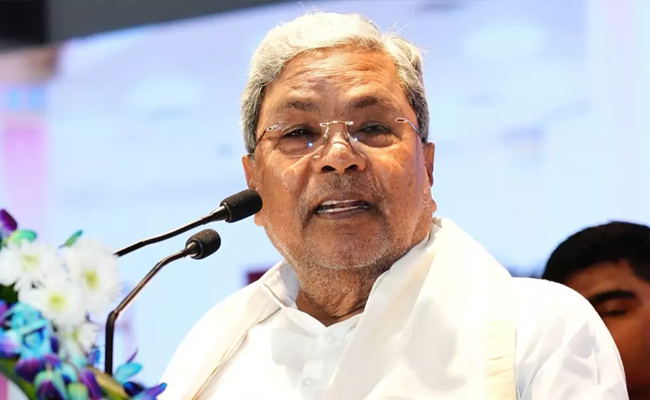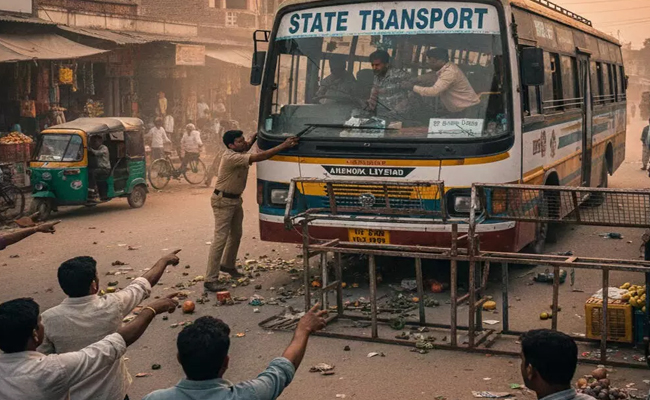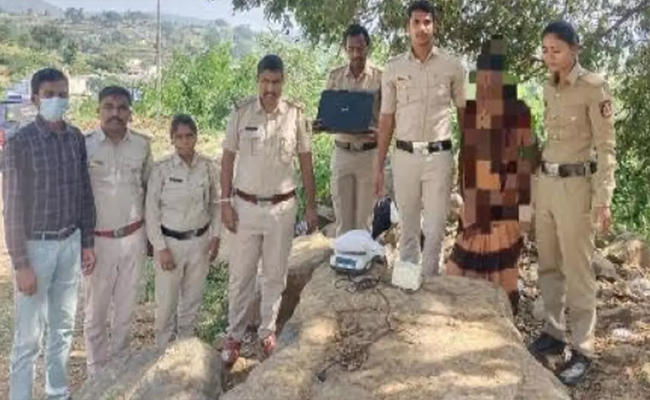New Delhi, Aug 27: Political parties were divided on reverting back to ballot paper in place of EVMs in elections and holding simultaneous polls to the Lok Sabha and Assemblies at an all-party meeting convened by the Election Commission that also discussed state funding.
The meeting of all the recognised national and state parties was convened to discuss the fidelity of electoral rolls, election expenditure regulation and inclusion of print media in the election campaign silence period.
Chief Election Commissioner O.P Rawat said the Commission would take a call on all the issues raised by parties including on EVMs and ballot paper, integrity of electoral rolls and ceiling on expenditure by political parties.
"There will be a satisfactory solution to the issues," he told reporters after the meeting.
Parties like the Congress, CPI, Trinamool Congress, BSP and DMK said that there should be return to ballot papers while the BJP and BJD said they were satisfied with electronic voting machines (EVMs).
The CPI-M said there should be more safeguards in the present process of voting. The AAP said either the count to verify electronic voting machine (EVM) results with Voter Verifiable Paper Audit Trail (VVPAT) should be increased or there should be a return to ballot paper while the AIADMK said it was fine both with EVMs and ballot paper.
Talking to reporters, Congress leader Mukul Wasnik said the party supported "the demand of using ballot paper in the election in the present situation." He said malfunctioning of EVMs was a major issue.
"VVPATs were introduced but are not being cross-checked. We demanded that at least 30 per cent of the votes should be cross-checked," Wasnik said.
He said more transparency was required in the voters list as a number of cases had surfaced in the recent past where lakhs and lakhs of bogus voters were found. "These bogus voters affect the entire electoral process."
BJP leader and union minister J.P. Nadda said the Election Commission's efforts to match EVM results with VVPAT was a good move.
"We should think ahead. The Election Commission has properly replied to all questions raised about the EVMs and we should look forward. (Using) VVPAT is a good move and it should be taken forward," he said.
Asked about the Congress demand for a return to ballot paper, he said that party's "habit of looking forward has ended."
Nadda said the BJP laid emphasis on correct identification of voters and proper training of people involved in the process. "(For) accurate voting there should be accurate identification. There should not be proxy identification."
Nadda said voter slip should not be the only way for identification as it can be purchased by an influential candidate and it should also be on the basis of six other identified documents.
"The other thing we said was that deletion of a voter from electoral rolls should be with a reason and should not take place below the level of district magistrate," he said.
Bahujan Samaj Party's Satish Misra said EVMs can be hacked. He said almost every party, except one, had made the demand and the world had gone back to the ballot paper.
Kalyan Banerjee of Trinamool Congress said they were demanding state funding of elections to check corruption and a ceiling limit on expenditure by a candidate.
He said there was time to implement voting through ballot paper before the Lok Sabha elections.
CPI-M's Nilotpal Basu said they mainly raised the question of funding of elections because this was the issue agitating the minds of electorate.
"Corporate funding has been promoted in such a big way." He said some parties want to go back to the ballot box but the CPI-M wanted much more thorough-going reforms.
He said simultaneous polls were not discussed but in the written submission the party had said that the suggestion was "totally anti-Constitutional."
AIADMK leader M. Thambidurai said the party was not against the ballot paper or EVMs.
"We are ready to face anything. At the same time, we suggested there should not be any malpractice, any doubt regarding EVM machines during the elections." He said state funding was the only answer to stop election malpractices.
CPI's Atul Kumar Anjan said there was a need to put an end to electronic voting system as many people in this country have sugar and eyesight related problems.
"Within eight seconds they cannot see to whom they have voted. There are lots of troubles with these electronic machines. Few people run the elections with money that is not politics."
BJD's Pinaki Mishra said: "We would ideally like the EC to lay down as to what percentage of the VVPAT paper trail they are going to count. Once that is done, I believe everyone should be reasonably satisfied."
He said his party supports the idea of simultaneous elections.
AAP's Raghav Chadha said EVMs can be easily hacked and there were incidents where these machines have created trouble during elections.
"At least 20 per cent voter verifiable paper audit trail (VVPAT) machines and electronic voting machines (EVMs) should be verified or paper ballot system should be implemented," he said.
Let the Truth be known. If you read VB and like VB, please be a VB Supporter and Help us deliver the Truth to one and all.
New Delhi: Chief Minister Siddaramaiah on Sunday asserted that fascism would not be allowed to enter India “through the back door of vote rigging” and called upon citizens to collectively defend the country’s democratic foundations.
Speaking after participating in an anti–vote rigging protest organised in New Delhi, Siddaramaiah said the gathering was not merely a political demonstration but a stand to protect Indian democracy. “We have come to the heart of our republic not as Congress workers or voters, but as protectors of Indian democracy,” he said.
Emphasising the importance of the right to vote, Siddaramaiah said it was the most sacred right guaranteed by the Constitution and the very foundation of democracy.
“Through voting, a farmer shapes the future of his children, a worker safeguards his dignity, a youth realises dreams, and a nation expresses its collective will,” he said.
He accused the BJP-led Union government of attempting to undermine this right through what he termed systematic vote rigging, including the alleged misuse of the special revision of electoral rolls. “This power is being stolen repeatedly,” he alleged.
ALSO READ: Bantwal police arrest two men for illegal sale of narcotics, seize two vehicles, 810 gm ganja
Warning against authoritarian tendencies, Siddaramaiah said history had shown that dictatorship does not begin with violence but with the misuse of institutions and manipulation of democratic systems.
“Across the world, authoritarian regimes pretend to protect democracy while quietly subverting it. This is what the BJP is doing today,” he charged.
He alleged that the ruling party was controlling institutions, intimidating electoral machinery, distorting voter lists, suppressing voter turnout in opposition strongholds, and misusing money and power. “This is not mere maladministration. Vote rigging is an attack on the very idea of India,” he said.
Siddaramaiah further claimed that governments formed through “stolen votes” could not be considered democratic.
“Such regimes survive through fear, fraud and distortion of the people’s mandate,” he said, adding that vote rigging posed the biggest threat to the republic since Independence.
Praising Leader of the Opposition in the Lok Sabha Rahul Gandhi, Siddaramaiah said he had shown exceptional courage in exposing alleged irregularities in voter lists, booth-level manipulation and “systematic, organised vote rigging” across several states, including Karnataka, Haryana and Bihar.
Referring to Karnataka, Siddaramaiah cited Mahadevpura and Aland constituencies as examples highlighted by Gandhi. In Mahadevpura, he said, thousands of allegedly fake and fraudulent voter entries and discrepancies in electoral rolls pointed to a narrow BJP victory. In Aland, he said, attempts were made to remove the names of legitimate voters ahead of the 2023 Assembly elections.
ALSO READ: Chamrajnagar: Woman arrested for selling ganja atop Male Mahadeshwara Hills
He noted that a Special Investigation Team (SIT) had recently filed a chargesheet accusing seven persons, including a former BJP MLA and his son, of attempting to delete the names of around 6,000 voters in Aland.
“This is a significant legal step in the fight against vote rigging,” he said.
Siddaramaiah concluded by stating that the fight against vote rigging was rooted in constitutional morality, Ambedkarite thought and the core principle of democracy. “Sovereignty belongs to the people, not to any party, regime or those who seek to steal elections,” he said.





